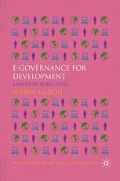Abstract
This book has provided an opportunity for a broader critical understanding of e-governance for development which is often concealed behind official consensus views. The perspective I have used for my critique and for analysing my three cases owes a lot to the work of scholars in the field of development studies, particularly those who have approached development and governance from a sociological perspective. My analysis has also been informed by field-work that I initially conducted in Gujarat in the late 1980s and have since reinforced through subsequent fieldworks in the states of Kerala and Karnataka. The cases I have presented are sites for my ongoing research on this topic and I hope they have provided the reader with a picture of the rich context within which rural e-governance projects are implemented in developing countries. Unfortunately, the complexity of the context within which e-governance projects are implemented is rarely traced in detail resulting in the project objectives losing all sense of actual reality. In this final chapter, I draw on salient points raised in the three cases. I have conceptualised each sector-specific e-governance application in terms of the influence of international development agencies on public policy-making, the implementation of the application within a specific context and the relevance of the project for improving the living conditions of beneficiary communities.
Access this chapter
Tax calculation will be finalised at checkout
Purchases are for personal use only
Preview
Unable to display preview. Download preview PDF.
References
Argyris, C. (1982) Reasoning, Learning and Action: Individual and organisational, Jossey Bass, San Francisco.
Argyris, C. (1990) Overcoming Organizational Defences: Facilitating organisational learning, Jossey Bass, San Francisco.
Cooke, B. and Dar, S. (2008) Introduction: The New Development Management. In The New Development Management: Critiquing the dual modernisation, eds, B. Cooke and S. Dar, Zed Books, London.
Court, J., Howland, I. and Young, J. (2005) Research and Policy in International Development: Introduction. In Bridging Research and Policy in Development: Evidence and the change process, edited by J. Court, I. Howland and J. Young, ITDG Publishing, Rugby, pp. 3–25.
Crew, E. and Young, J. (2002) Bridging Research and Policy: Context, evidence and links, ODI Working Paper No. 173, Overseas Development Institute, London.
Garrett, J.L. and Islam, Y. (1998) Policy Research and the Policy Process: Do the twain every meet? Gatekeeper Series, 74, International Institute for Environment and Development, London.
The Guardian (2008a) All Out on Poverty. Supplement produced in association with the Department for International Development, 24 September. Available at guardian.co.uk/alloutonpoverty
The Guardian (2008b) Chaos as £13 bn. NHS Computer System falters. 10 August.
Hanney, S., Gonzalez-Block, M., Buxton, M. and Kogan, M. (2003) The Utilisation of Health Research in Policy-Making: Concepts, examples and methods of assessment, Health Research Policy and Systems, 23, 1, pp. 1–28.
Hendy, J., Reeves, B.C., Fulop, N., Hutchings, A. and Masseria, C. (2005) Challenges to Implementing the National Programme for Information Technology (NPfit): A qualitative study, BMJ, 331, pp. 331–336.
Johnson, H. and Thomas, A. (2007) Individual Learning and Building Organisational Capacity for Development, Public Administration and Development, 27, pp. 39–48.
Land, F. (2008) Frank Land’s Reflections, DSSResources.Com. 16 March. Available at http://dssresources.com/reflections/land/land03162008.html
Land, F. and Kennedy-McGregor, M. (1987) Information and Information Systems: Concepts and perspectives. In Information Analysis: Selected readings, edited by R. Galliers, Addison-Wesley Publishing Company, Wokingham, UK.
Mamman, A. and Rees, C. (2007) Towards the Understanding of Development Policy Failures through the Eyes of Management and Organisational Theories: Research agenda, Management in Development Working Paper Series, No. 18, Institute for Development Policy and Management, University of Manchester.
Mosse, D. (1998) Process Documentation Research and Process Monitoring: Cases and issues. In Development as Process: Concepts and methods for working with complexity, edited by D. Mosse, J. Farrington and A. Rew, Routledge, London, pp. 31–55.
Narayan, G. (2007) Addressing the Digital Divide: E-Governance and M-Governance in a hub and spoke model, The Electronic Journal of Information Systems in Developing Countries, 31, 1, pp. 1–14.
Nilekani, N. (2009) Imagining India: Ideas for a renewed nation, Penguin Press.
Rodrik, D. (2004) How to Make the Trade Regime Work for Development, Harvard University Press, Cambridge, MA.
Sen, A. (2004) How Does Culture Matter? In Culture and Public Action, edited by V. Rao and M. Walton, Stanford University Press, Stanford, CA, pp. 37–59.
Sen, A. (2006) The Man without a Plan, Foreign Affairs, March/April, 85, 2, pp. 171–177.
Silva, L. and Westrup, C. (2009) Development and the Promise of Technological Change, Information Technology for Development, 15, 2, pp. 59–66.
Smith, M.K. (2001) Chris Argyris: Theories of Action, Double-Loop Learning and Organizational Learning, The Encyclopedia of Informal Education. Available at www.infed.org/thinkers/argyris.html
Surr, M., Barnett, A., Duncan, A. and Speight, M. (2002) Research for Poverty Reduction: DFID Research Policy Paper, Development Committee Meeting, 24 October.
Sutton, T. (1999) The Policy Process: An overview, ODI Working Paper 118, ODI, London.
The Telegraph (2007) Patients ‘won’t benefit from £12 bn. IT Project’. 17 April.
White, H. (2005) Challenges in Evaluating Development Effectiveness, IDS Working Paper, 242, Institute of Development Studies, Brighton, Sussex.
Author information
Authors and Affiliations
Copyright information
© 2009 Shirin Madon
About this chapter
Cite this chapter
Madon, S. (2009). Conclusion. In: e-Governance for Development. Technology, Work and Globalization. Palgrave Macmillan, London. https://doi.org/10.1057/9780230250499_10
Download citation
DOI: https://doi.org/10.1057/9780230250499_10
Publisher Name: Palgrave Macmillan, London
Print ISBN: 978-1-349-29972-0
Online ISBN: 978-0-230-25049-9
eBook Packages: Palgrave Business & Management CollectionBusiness and Management (R0)

